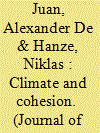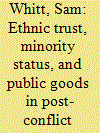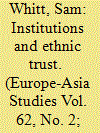|
|
|
Sort Order |
|
|
|
Items / Page
|
|
|
|
|
|
|
| Srl | Item |
| 1 |
ID:
178652


|
|
|
|
|
| Summary/Abstract |
While a large body of research has highlighted the conflict-inducing effects of climate change, we still know very little about the mechanisms linking environmental conditions to violent conflict. This article investigates the plausibility of a prominent channel according to which scarcity of natural resources can foster violent conflict through deteriorating intergroup relations. In addition to assessing the direct effects of adverse environmental conditions on intra-ethnic and inter-ethnic trust, we suggest a conditional argument on the role of horizontal inequality of hazard exposure. Environmental hazards are ‘unequal’ if they systematically affect ethnic groups differently. While inequality may reinforce intra-ethnic ties and out-group suspicion, equal hazard exposure may create a sense of unity among diverse victims in their collective struggle to cope with harsh environmental conditions. We test these arguments in the context of the severe drought periods that affected most East African countries in the years 2004 and 2005. The empirical analysis combines gridded information on drought severity with geo-located survey data across six countries in the region (Afrobarometer survey 2005/2006). Our main analyses find that exposure to drought hazards correlates positively with self-reported trust within and across ethnic groups. The latter association, however, depends on the degree of intergroup equality of hazard exposure and wanes as inequality increases. Taken together, these findings indicate that if droughts increase the risk of violent conflict, they seem to do so through mechanisms other than intergroup polarization and despite their positive association with ethnic trust. This is most likely the case in contexts where there is pronounced horizontal inequality of drought hazards.
|
|
|
|
|
|
|
|
|
|
|
|
|
|
|
|
| 2 |
ID:
182684


|
|
|
|
|
| Summary/Abstract |
This study considers how ethnic trust and minority status can impact the ability of ethnic groups to pursue cooperative public goods, focusing on groups with a history of conflict and lingering hostility. A public good experiment between ethnic Albanians and Serbs in postwar Kosovo reveals that subjects contribute far more to a mutually beneficial public good when they are part of an experimentally induced coethnic majority. However, when in the minority, subjects not only underinvest, but many actively divest entirely, privatizing the public good. Majority/minority status also has wide-ranging implications for how individuals relate to real-world public goods and the institutions of government that provide them. Compared to majority Albanians, survey data indicate how minority Serbs in Kosovo express greater safety and security concerns, feel more politically, socially, and economically excluded, are more dissatisfied with civil liberties and human rights protections, and are less likely to participate politically or pay taxes to support public goods. Conflict-related victimization and distrust of out-groups are strong predictors of these minority group attitudes and behaviors. This suggests a mechanism for how conflict amplifies out-group distrust, increasing parochial bias in public good commitments, especially among minorities who are wary of exploitation at the hands of an out-group majority. To restore trust, this study finds that institutional trust and intergroup contact are important to bridging ethnic divides that inhibit public good cooperation.
|
|
|
|
|
|
|
|
|
|
|
|
|
|
|
|
| 3 |
ID:
093721


|
|
|
|
|
| Publication |
2010.
|
| Summary/Abstract |
This study considers the prospects for rebuilding trust in a multi-ethnic society with a history of ethnic violence. Findings are based on survey data from a stratified random sample of 681 Bosnian Serbs, Croats and Bosniaks, conducted between September 2003 and January 2004. The data indicate significant trust problems in Bosnian society both within and across ethnicity. However, the study also finds strong linkages between ethnic trust and trust in institutions, suggesting that institutions can play a vital role in restoring ethnic trust and promoting reconciliation.
|
|
|
|
|
|
|
|
|
|
|
|
|
|
|
|
|
|
|
|
|